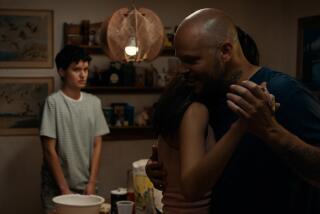Coppola tries to open a door
A door slams shut; a lock turns; a room goes dark.
That is how the conversation between the long-estranged brothers of “Tetro” begins in Francis Ford Coppola’s haunting, beautiful and often frustrating new film.
Families, in the cinematic lexicon of the godfather, are made of brutal stuff; love and loyalty are the weapons of choice, secrets are a given, betrayal is everywhere and blood is always drawn. In “Tetro,” it is the seductive power of artistic genius and fame that will both leave a family broken and bind its wounds. If it sounds like it might be Coppola’s own story, he says no, yes, a little perhaps.
Vincent Gallo is Tetro, the older brother who long ago escaped the monstrous father, a world renowned conductor, whose artistry leaves his audiences weeping but whose abuse destroys his sons. Younger brother Bennie (excellent newcomer Alden Ehrenreich) has traced Tetro to an apartment in La Boca, a bohemian section of Buenos Aires, where the failing poet-playwright has taken up residence as if distance and silence is all it takes to end a relationship.
In case we didn’t suspect it going in, Coppola quickly lets us know this is a textured story he intends to tell. La Boca, the brothers and the tale itself are bathed in the thousand shades of gray that black-and-white filming, and thinking, make possible. Color, when it comes, is surreal, splashes that tint the past and sometimes the experimental theater world of Buenos Aires that “Tetro” inhabits.
Bennie, just turning 17 and with all the awkward energy of a young colt, has shown up on the doorstep of his beloved brother with a duffel bag packed full of clothes, questions and hope. After that first silent night, Tetro’s girlfriend Miranda (Maribel Verdu) negotiates an uneasy peace, and the bruising process of the brothers finding their way back to each other begins.
When we first see Tetro, he is emerging from the bedroom, leg in a cast, a cane in hand. A deer-in-the-headlights moment with a bus late one night was the cause. Accidents, bad ones, pile up like litter around this family, defining it and the fate of everyone in it.
Conversations are tense in the tiny La Boca apartment, the brothers circling a thousand elephants in the room. Having refined the art of escape, Tetro is soon off getting the cast removed, leaving Bennie to rummage through the apartment alone, searching for the answers Tetro denies him.
There is a suitcase shoved onto a top shelf in an alcove, where Bennie discovers Tetro’s last play, a mess of notes, a work tortured and unfinished. Like Pandora’s box, family secrets begin tumbling out as he begins to decipher his brother’s notes. I say decipher because the pages can only be read by holding them up to a mirror. Therein lies the rub. Coppola has made “Tetro” unnecessarily difficult. It’s as if in writing the screenplay, his first original story in 30 years, he’s bearing down so hard on the pencil that the point is forever breaking, the page is forever tearing.
In “Tetro,” nearly every time Coppola should have clung to intimacy, he opts for excess. Especially tedious are the meta excerpts from staged productions -- overcompensation trying to masquerade as illumination. Regrettable since there is such fine work being done in the smaller moments, particularly by the wonderful Verdu of “Pan’s Labyrinth” and “Y tu mama tambien,” the always provocative Gallo, and Ehrenreich, someone I hope we see much more of.
Now 70, Coppola, like Tetro, is trying to escape the weight of a grand legacy, returning to a more organic form of filmmaking with stories closer to his heart. “Youth Without Youth” was the first, a disappointing muddle that was roundly rejected. With “Tetro,” it feels as if the director is regaining his footing, figuring out which parts of his past to hold on to and which to let go.
--
--
‘Tetro’
MPAA rating: This film is not rated.
Running time: 2 hours, 7 minutes; English and subtitled Spanish
Playing: Landmark Westside Pavilion
More to Read
Only good movies
Get the Indie Focus newsletter, Mark Olsen's weekly guide to the world of cinema.
You may occasionally receive promotional content from the Los Angeles Times.











